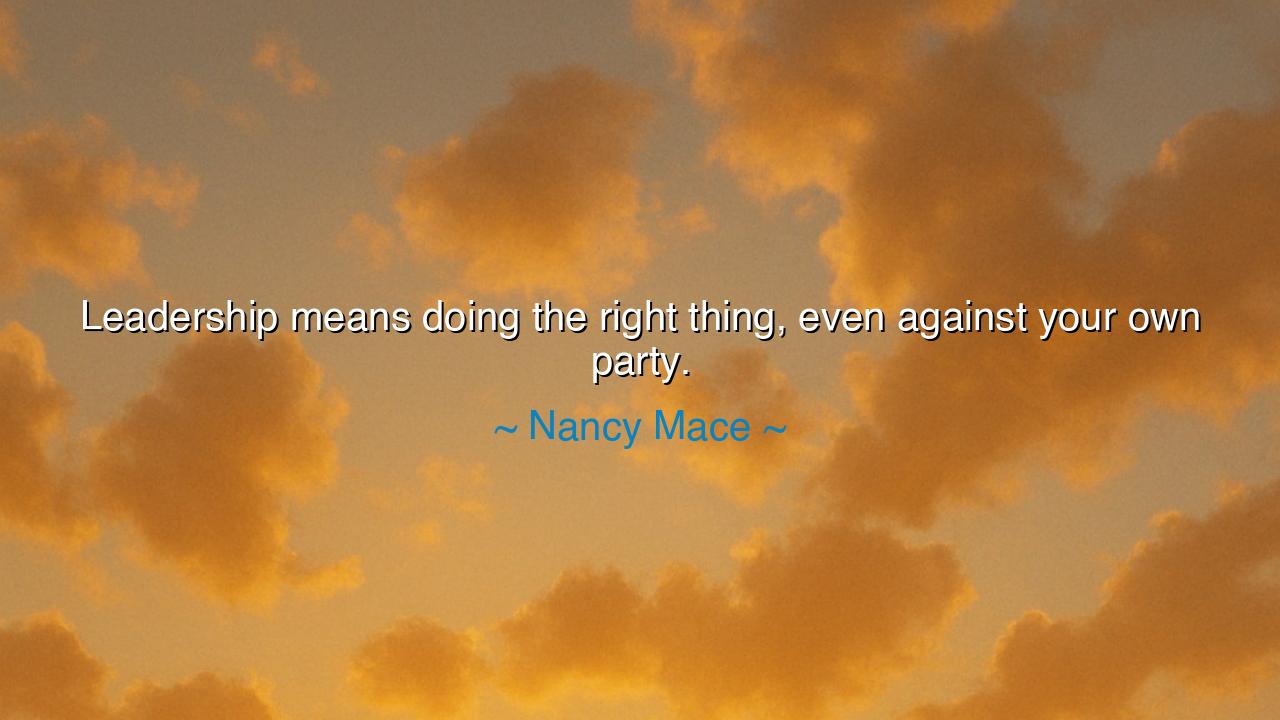
Leadership means doing the right thing, even against your own






“Leadership means doing the right thing, even against your own party.” — Nancy Mace
Hear these words, O student of truth and servant of justice, for they speak of one of the hardest virtues ever demanded of the soul — courage. When Nancy Mace, a voice of conviction in the halls of governance, uttered this, she spoke not merely of politics, but of the eternal battle between loyalty and conscience, between belonging and righteousness. Her words rise above the realm of parties and laws to touch the moral foundation of all leadership: that to lead is not to serve comfort or tribe, but to serve truth — even when it isolates, even when it wounds. For the true leader is not the echo of a crowd but the bearer of a light, walking through storms to hold fast to what is right.
The origin of this wisdom lies in the ancient struggle of power and principle, as old as the dawn of human order. Mace, in speaking of doing the right thing even against your own party, confronted the modern temptation that ensnares many: the desire to please, to conform, to protect one’s place rather than one’s purpose. But the heart of true leadership beats to a higher rhythm — one that listens not to applause, but to conscience. To stand apart from one’s allies when truth demands it is no small feat, for it invites exile from comfort and kin alike. Yet such defiance, when born of integrity, shapes the destiny of nations and souls alike.
The ancients knew this well. Recall Marcus Aurelius, the philosopher-king of Rome, surrounded by generals and senators urging conquest and glory. Yet he held firm to justice and moderation, often denying his own council, sometimes angering his peers, for he knew that to rule rightly was to act not for favor, but for truth. He wrote, “If it is not right, do not do it; if it is not true, do not say it.” This is the eternal echo of Mace’s words — the law that every leader must engrave upon their heart: the right thing must prevail, even against the will of one’s own faction.
But such strength comes with loneliness. To defy the collective, even when justified, is to invite suspicion, mockery, and betrayal. History remembers Socrates, who refused to bow to the pressures of his city when Athens demanded conformity. Offered the chance to renounce his ideas and live, he chose instead to die with honor, drinking the cup of poison as calmly as one who drinks truth itself. His death was not defeat, but victory — a reminder that integrity outweighs safety, and that doing the right thing is a crown that no decree can bestow or revoke.
This is the path Mace’s words illuminate: the narrow way of conscience. Leadership is not blind loyalty to banner or tribe; it is the unwavering pursuit of what is just. The politician who betrays truth for his party wins applause, but loses the trust of posterity. The soldier who obeys an unjust order conquers land, but not honor. Yet the leader who dares to stand against his own camp when principle demands it becomes immortal in the hearts of those who cherish freedom. For truth, though scorned for a season, always rises again — and it remembers those who served it faithfully.
The lesson is this: stand firm in what is right, even when those nearest to you turn away. The world will tell you that loyalty is virtue, but it will not tell you that blind loyalty is poison. Loyalty to truth must come before loyalty to party, tribe, or ambition. Listen always to your conscience, for it is the oldest and most faithful guide of the human soul. To lead is to walk alone at times — to choose the harder road not because it is easy, but because it is right.
So remember, O child of courage, that leadership is not measured by obedience, but by integrity. When you are tested — when your friends demand silence, when your party demands compromise, when your heart trembles between acceptance and conviction — look inward. Ask not, “What will please them?” but “What is just?” Then act. Even if your path grows lonely, it will be lit by the fire of truth. For as Nancy Mace declared, and as the ages affirm, leadership means doing the right thing — even against your own party, your own comfort, and your own fear.
And in that moment, when you stand for what is right though all others fall away, know this: you have not lost the crowd — you have found your soul.






AAdministratorAdministrator
Welcome, honored guests. Please leave a comment, we will respond soon